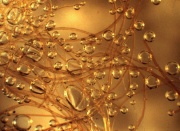Sodium azide test
Description
A microchemical test used to identify potentially hazardous Sulfur components in materials prior to their use near Silver objects. The sodium azide test detects the presence of reducible sulfur but not stable sulfur compounds such as sulfates. Reducible sulfur compounds can readily tarnish silver. For the test, 3 gm of sodium azide is dissolved in 100 ml of a 0.05 M Iodine solution, then mixed with 3 ml methylated spirits and allowed to set for 30 minutes. A small portion of the test sample (2 mm fiber or 200 micron particles) is placed on a glass microscope slide under a coverslip. While observing the sample with a microscope (usually 40x), the reagent is introduced under the coverslip. Reducible sulfur produces visually apparent bubbles due to the formation of nitrogen during its reaction with the sodium azide/iodine solution. Wool fibers can be used as a reference for a positive test.
Synonyms and Related Terms
iodide azide test
Risks
- Sodium azide is highly toxic.
- ThermoFisher: SDS
Resources and Citations
- N.Odegaard, S.Carroll, W.Zimmt, Material Characterization Tests for Objects of Art and Archaeology, Archetype Publications, London, 2000.
- V. Daniels, S Ward, "A Rapid Test for the Detection of Substance which will Tarnish Silver" Studies in Conservation, 27(2), 1982, p.58-60.
- Richard S. Lewis, Hawley's Condensed Chemical Dictionary, Van Nostrand Reinhold, New York, 10th ed., 1993
- Pam Hatchfield, Pollutants in the Museum Environment, Archetype Press, London, 2002
- The Merck Index, Martha Windholz (ed.), Merck Research Labs, Rahway NJ, 10th edition, 1983 Comment: entry 8724
